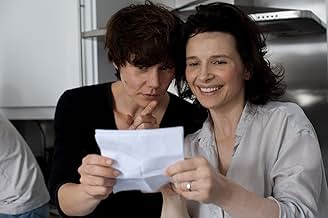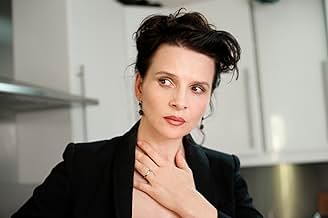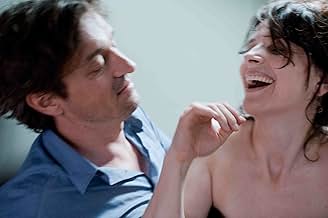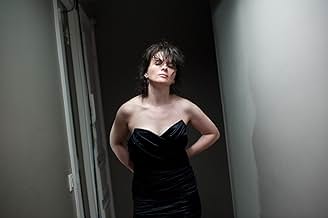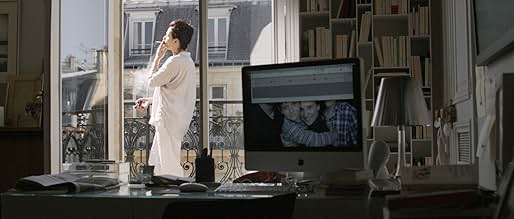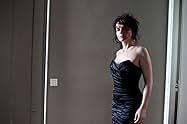IMDb RATING
5.6/10
7.9K
YOUR RATING
On her latest assignment, a journalist for Elle immerses herself in a prostitution ring run by university students.On her latest assignment, a journalist for Elle immerses herself in a prostitution ring run by university students.On her latest assignment, a journalist for Elle immerses herself in a prostitution ring run by university students.
- Director
- Writers
- Stars
- Awards
- 1 win total
- Director
- Writers
- All cast & crew
- Production, box office & more at IMDbPro
Featured reviews
Some of the sequences in Malgorzata Szumowska's film are quite difficult to view - especially the scene where one of the student prostitutes (Anaïs Demoustier) willingly allows herself to be urinated on by one of her clients, or has a champagne bottle thrust into her vagina. These moments are designed to emphasize the pitfalls of the whore's existence - even if both Charlotte and Alicja (Joanna Kulig) manage to make sufficient funds to support themselves in some style during their student lives.
Nonetheless Szumowksa reminds us that we should not judge their decision too harshly. By contrasting their lives with that of well- to-do journalist Anna (Juliette Binoche), who is writing an article for ELLE magazine about their lives, the director suggests that in many ways the prostitutes live a superior existence. They enjoy an independence that is denied to someone like Anna, who has to spend most of her leisure time caring for a feckless husband (Louis-Do de Lencquesaing) and her three children. ELLES is full of scenes where Anna is shown working alone in the kitchen, or talking on the phone to a disembodied voice. As the film closes, she is shown silently listening at a dinner party while Patrick and his friends prattle on about various subjects; in the end she grows so frustrated that she simply walks out of the house for a breath of welcome fresh air.
In contrast both Charlotte and Alicja enjoy a considerable degree of independence; they exert power over their (mostly middle-aged) clients, to the extent that they can determine in advance what they will do and what they will not do. The money they earn gives them the spending power to please themselves.
As the film progresses, so we see Anna becoming more and more enamored of the girls' lives. She is shown talking in the park to Charlotte; the two of them become quite close to one another, as denoted through a series of two-shots. While alone with Alicja in Alicija's apartment, Anna partakes of vodka (although claiming that she does not drink), and ends up on a passionate embrace with the younger woman. While alone in her own apartment, Anna pleasures herself in an extended scene, where Szumowska's camera focuses on her face as she gradually comes to orgasm. Sex gives her the kind of power that she can never enjoy either at work or during her family life.
In the end, however, that power proves illusory. The film ends with an extended shot of Anna sitting down to breakfast with her husband and two of her children - an image of familial normality that suggests mental as well as physical imprisonment. Although empathizing with the two girls, she can never enjoy their independence.
ELLES is a thought-provoking piece, shot in deliberately low-key style. Director Szumowska achieves some striking thematic effects, most notably through the use of music that often contrasts with the emotions of the characters shown on screen. At one moment Anna is shown walking morosely about her living-room; on the soundtrack we hear the second movement of Beethoven's Seventh Symphony - a homage to death. The grandeur of the music is set against the mundaneness of Anna's life; she would love to improve it, if only she could.
Nonetheless Szumowksa reminds us that we should not judge their decision too harshly. By contrasting their lives with that of well- to-do journalist Anna (Juliette Binoche), who is writing an article for ELLE magazine about their lives, the director suggests that in many ways the prostitutes live a superior existence. They enjoy an independence that is denied to someone like Anna, who has to spend most of her leisure time caring for a feckless husband (Louis-Do de Lencquesaing) and her three children. ELLES is full of scenes where Anna is shown working alone in the kitchen, or talking on the phone to a disembodied voice. As the film closes, she is shown silently listening at a dinner party while Patrick and his friends prattle on about various subjects; in the end she grows so frustrated that she simply walks out of the house for a breath of welcome fresh air.
In contrast both Charlotte and Alicja enjoy a considerable degree of independence; they exert power over their (mostly middle-aged) clients, to the extent that they can determine in advance what they will do and what they will not do. The money they earn gives them the spending power to please themselves.
As the film progresses, so we see Anna becoming more and more enamored of the girls' lives. She is shown talking in the park to Charlotte; the two of them become quite close to one another, as denoted through a series of two-shots. While alone with Alicja in Alicija's apartment, Anna partakes of vodka (although claiming that she does not drink), and ends up on a passionate embrace with the younger woman. While alone in her own apartment, Anna pleasures herself in an extended scene, where Szumowska's camera focuses on her face as she gradually comes to orgasm. Sex gives her the kind of power that she can never enjoy either at work or during her family life.
In the end, however, that power proves illusory. The film ends with an extended shot of Anna sitting down to breakfast with her husband and two of her children - an image of familial normality that suggests mental as well as physical imprisonment. Although empathizing with the two girls, she can never enjoy their independence.
ELLES is a thought-provoking piece, shot in deliberately low-key style. Director Szumowska achieves some striking thematic effects, most notably through the use of music that often contrasts with the emotions of the characters shown on screen. At one moment Anna is shown walking morosely about her living-room; on the soundtrack we hear the second movement of Beethoven's Seventh Symphony - a homage to death. The grandeur of the music is set against the mundaneness of Anna's life; she would love to improve it, if only she could.
Although directed and co-written by a Polish woman (Malgorzata Szumowska), this French-language film has so many of the ingredients that we associate with Gallic art house movies: it is slow and ponderous, the narrative is fractured, there is smoking, drinking, and eating, there is sex but much of it is sordid or sad or sadistic, there are scenes which are simply inexplicable, and the conclusion is utterly unresolved and even senseless.
Juliette Binoche plays Anne, a journalist with "Elle" researching an article on how students fund their education through prostitution. Apparently she only interviews - repeatedly - two students: the French girl Charlotte (Anaïs Demoustier) and the Polish girl Alicja (Joanna Kulig). Neither hooker seems as unsettled by the lifestyle she has chosen as Anne appears unbalanced by the interviews. It is all rather disjointed and unsatisfactory and the only reason for seeing the film is the wonderful work of the ever-impressive Binoche.
Juliette Binoche plays Anne, a journalist with "Elle" researching an article on how students fund their education through prostitution. Apparently she only interviews - repeatedly - two students: the French girl Charlotte (Anaïs Demoustier) and the Polish girl Alicja (Joanna Kulig). Neither hooker seems as unsettled by the lifestyle she has chosen as Anne appears unbalanced by the interviews. It is all rather disjointed and unsatisfactory and the only reason for seeing the film is the wonderful work of the ever-impressive Binoche.
According to some reports, great many female students in France financed their studies from prostitution. This film starts from this report. Juliette Binoche plays the journalist who interviews two of these girls. Many times.
She tries to analyze it all from a cold professional view, but finds that she is the one who changes and maybe also gets analyzed. The girls tell her they are abused sometimes, but Binoche is the one who takes the biggest injuries.
Interesting film about "Western morals" declining more and more in all ways, since we're not interesting in sharing profits like we used to. But the film is a little cold and and analyzing, just like a professional journalist should be.
She tries to analyze it all from a cold professional view, but finds that she is the one who changes and maybe also gets analyzed. The girls tell her they are abused sometimes, but Binoche is the one who takes the biggest injuries.
Interesting film about "Western morals" declining more and more in all ways, since we're not interesting in sharing profits like we used to. But the film is a little cold and and analyzing, just like a professional journalist should be.
We've seen similar films dealing with the subject of student prostitution, so when coming to view this, it's a tired watch. It's been all done before. The movie starts where we're further into the story, where journalist, Binoche, who carries the film in a great if bold performance, interviews two young beautiful girls, selling and indulging in sex with older men, kind of bringing much similarity, I would say to that later Art house film, Young And Beautiful, which I haven't yet seen. There are some truly hot sex scenes in this film, from our two lasses, one featuring a middle aged guy getting into Demoustier's lacey panties, and boy, does she want it. Slowly disassociating herself from her family, as well as having problems with the fridge door, Binoche immerses and loses herself into this life, becoming good friends with both girls, causing her to privately masturbate, and give hubby something he hasn't had in a while, where the film suddenly ends. The films fault, like Binoche losing herself, the film loses it's intentions, handling of story, where the movie shallowy touches on the subject, and doesn't go into enough depth of the girl's backgrounds, like why they do it, and what really has led em to this point, where meeting mommy of one of the girls, was at least something. But the film gets more caught up in the sex between call girl and client, which is the film's real failing. This was angrily disappointing in one sense, as the end credits rolled. It's Binoche's film, though. Watch it for her, the film's only strong savior.
This movie, like another recent French movie "Student Services", exposes the apparent current social problem of impoverished Parisian female university students resorting to prostitution. In America movies like this are generally preachy and alarmist and usually relegated to the Lifetime network where they're viewed mostly by bored housewives. I'm not exactly sure WHO these French movies are aimed at though, and they seem a little hypocritical. If you REALLY want to de-glamorize co-ed prostitution should you show quite so many scenes of impossibly attractive French actresses like Deborah Francois (in "Student Services") or Anais Demoustier (in this) having hot, naked, kinky sex? Women might appreciate the social message here, but most men will find it a little hard to concentrate on the message what with all the blood flowing from their brains to their boners. Even the middle-age female protagonist of this movie, a journalist played by Juliette Binoche, is so turned on by audiotapes of the Demnoustrier character's sex sessions that at one point she has to go in the bathroom and pleasure herself. She becomes so obsessed with her "expose" that she neglects her husband and children. She's definitely a strange, and not particularly likable, character.
The movie is also surprisingly kinky. Demoustier's prostitute character has wine bottle inserted in her butt by a sadistic client. Another Polish prostitute has her large breasts urinated on. These scenes aren't graphic, of course, but the fact that they're included at all--combined with a rather muddled moral message--definitely tends to move this toward lurid exploitation.
Binoche is not very good in this, but it might be the character she's saddled with. Demoustier is both sexy and adorable, but doesn't have much of a role, and her character pretty much disappears after the assault with the wine bottle. I didn't dislike this movie, but I prefer the similar "Student Services". It too seems a little at odds with itself message-wise, but it gives the major role to its sympathetic prostitute character. And it's not QUITE so exploitative and hypocritical.
The movie is also surprisingly kinky. Demoustier's prostitute character has wine bottle inserted in her butt by a sadistic client. Another Polish prostitute has her large breasts urinated on. These scenes aren't graphic, of course, but the fact that they're included at all--combined with a rather muddled moral message--definitely tends to move this toward lurid exploitation.
Binoche is not very good in this, but it might be the character she's saddled with. Demoustier is both sexy and adorable, but doesn't have much of a role, and her character pretty much disappears after the assault with the wine bottle. I didn't dislike this movie, but I prefer the similar "Student Services". It too seems a little at odds with itself message-wise, but it gives the major role to its sympathetic prostitute character. And it's not QUITE so exploitative and hypocritical.
Did you know
- TriviaDirector Malgorzata Szumowska revealed Joanna Kulig, who in the film plays a prostitute, was so afraid of the scene where she is naked with a client who is peeing over her. "It was amazing that for three months she was afraid of that scene. But what was challenging was that when she starts to do it, she did it very fast. In a few hours without any hysteria, no questions." During that scene Kulig wanted to hear classical music and asked that not all the crew were on the set. "For me it was very difficult to keep concentrated!" - the actress said. "The scene was funny. On the sixth time [the juice machine] was broke so we had to stop. And everybody started to laugh. I had to be very concentrated. To have a serious face thinking about the subject. And I started to play and for two minutes, 'Sorry! We have to stop. This machine doesn't work with the juice!' And everybody...."
- Crazy creditsClosing credits begin during a breakfast scene with Anne's family.
- ConnectionsFeatures We Fuck Alone (2006)
- SoundtracksSymphony No. 7 Op. 92 II. Allegretto
Written by Ludwig van Beethoven
- How long is Elles?Powered by Alexa
Details
- Release date
- Countries of origin
- Official sites
- Languages
- Also known as
- Gái Gọi Nữ Sinh
- Filming locations
- Production companies
- See more company credits at IMDbPro
Box office
- Budget
- €4,000,000 (estimated)
- Gross US & Canada
- $157,508
- Opening weekend US & Canada
- $24,286
- Apr 29, 2012
- Gross worldwide
- $3,822,241
- Runtime
- 1h 39m(99 min)
- Color
- Sound mix
- Aspect ratio
- 2.35 : 1
Contribute to this page
Suggest an edit or add missing content


